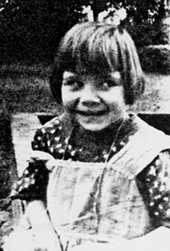Search for Names, Places and Biographies
Already layed Stumbling Stones
Suche
Edith Juschka * 1928
Erste Brunnenstraße 1 / Ecke Michaelisstraße (Hamburg-Mitte, Neustadt)
HIER WOHNTE
EDITH JUSCHKA
JG. 1928
EINGEWIESEN 1932
ALSTERDORFER ANSTALTEN
"VERLEGT" 1943
HEIL- UND PFLEGEANSTALT
AM STEINHOF / WIEN
ERMORDET 11.11.1944
further stumbling stones in Erste Brunnenstraße 1 / Ecke Michaelisstraße:
Helga Nieber
Edith Paula Marie Juschka, born on 19 Sept. 1928 in Hamburg, admitted on 27 May 1932 to what was then the Alsterdorf Asylum (Alsterdorfer Anstalten), transferred on 16 Aug. 1943 to the Vienna Municipal Wagner von Jauregg-Heil- und Pflegeanstalt, a "sanatorium and nursing home,” died on 11 Nov. 1944
Intersection of First Brunnenstrasse 1 and Michaelisstrasse (Mauerstrasse 14a)
Edith Juschka was born in Hamburg as the youngest child of the worker Johann Juschka (born on 4 Apr. 1886 in Colleschen) and his wife Emma, née Putzar (born on 6 Aug. 1892 in Engelswacht). Her parents had been married on 13 June 1914. The family, which also included the 14-year-old older sister Hertha and the eight-year-old brother Hans Wilhelm, lived at Mauerstrasse 14a (no longer existent; Mauerstrasse was renamed Michaelisstrasse; the western section, which intersected Erste Brunnenstrasse, was developed with office buildings).
At the beginning of the 1930s, Johann Juschka became unemployed and was forced to apply for welfare support. An excerpt from the welfare file dated 4 Feb. 1932 shows that Edith had fallen ill with polio at an early age. The file noted further: "The child does a lot of damage. All accessible objects are torn with [the] teeth, she wets herself and thus the use of clothing is considerable.” As early as 1931, doctors recommended that Edith be admitted to an institution. The Yushka couple could not, however, bring themselves to take this step. After renewed advice from a doctor of the "Deutsche Vereinigung für Säuglingsschutz Hamburg” ("German association for infant protection in Hamburg”), three-year-old Edith was admitted to what was then the Alsterdorf Asylum (Alsterdorfer Anstalten, today Protestant Alsterdorf Foundation [Evangelische Stiftung Alsterdorf]) on 27 May 1932, with a diagnosis of "right-sided spastic paralysis as a result of cerebral poliomyelitis and high-grade feeblemindedness, incontinent.”
Edith was described as a wild, restless child who was resourceful despite the one-sided paralysis. For instance, the nursing staff later stated that she could run in a way "that you have to wonder.” In 1934, she made "progress” such as the following: "Now comes immediately as soon as she is called; conscientiously executes small assignments.” Reportedly, she had become much calmer and tried to repeat whatever was said. After that, only negative evaluations followed, especially when she had been returned after a family leave or her mother had visited her every Wednesday and Sunday. Epileptic seizures were first recorded in Aug. 1939.
In the last entries during her eleven-year stay in "Alsterdorf,” Edith was characterized as an "unpleasant child” and even as "malignant,” since she allegedly always scratched and bit her fellow patients. Since she often had seizures, she was kept in a "protective jacket” ("Schutzjacke,” i.e., a straitjacket). Her "obstinacy,” often described, as well as epileptic seizures were certainly two of the reasons why, one among 228 handicapped girls and women, she was transferred to the Vienna Municipal Wagner von Jauregg-Heil- und Pflegeanstalt on 16 Aug. 1943 on the grounds that the institution had been damaged by air raids.
Her Vienna file reveals that she quickly came to be regarded as restless and wild there as well. To sedate her, she was given sleep-inducing medicine at night.
Less than a month after her transport, Edith’s mother asked the institutional administration in Vienna about her daughter’s condition. Edith’s married sister, Hertha Timm, also expressed concern at the beginning of Nov. 1944 and asked for news by letter. She received a so-called "warning letter,” signed by the hospital physician by the name of Wunderer, that was to prepare for the news of her death: "In response to your letter, we inform you that your sister did not sustain any harm from the air raids on Vienna, but that she is currently suffering from pneumonia and that her condition is very serious.”
Four days later, on 11 Nov. 1944, 16-year-old Edith Yushka died. She weighed only 31 kilograms (slightly over 68 lbs.) in the very end, which suggests starvation.
Translator: Erwin Fink
Kindly supported by the Hermann Reemtsma Stiftung, Hamburg.
Stand: May 2020
© Susanne Rosendahl
Quellen: Archiv Evangelische Stiftung Alsterdorf, Patientenakten der Alsterdorfer Anstalten, V 187 Edith Juschka; StaH 332-5 Standesämter 3246 u 428/1914; Wunder: Exodus, S. 213f.


